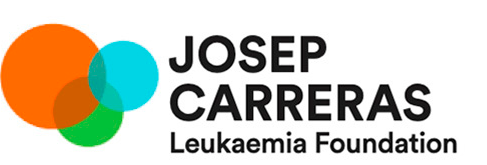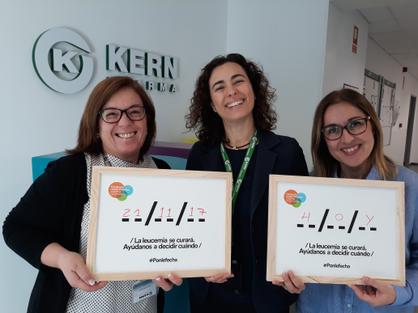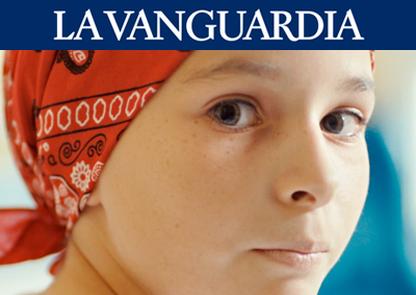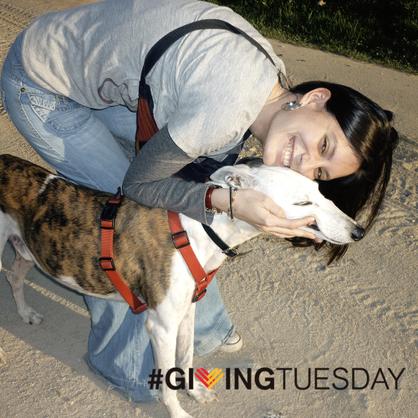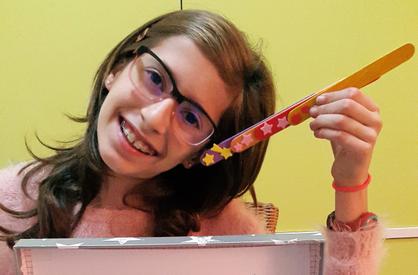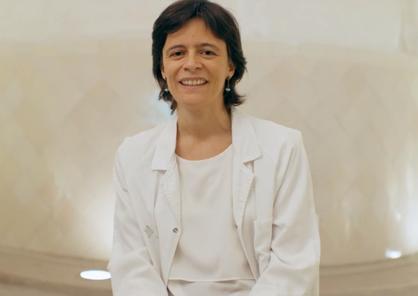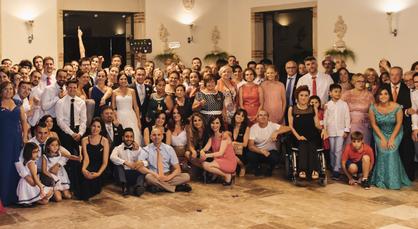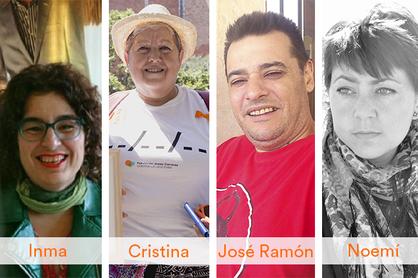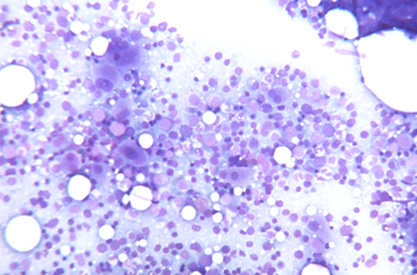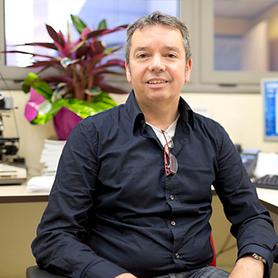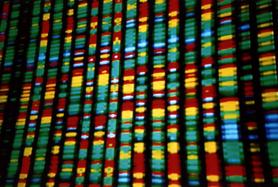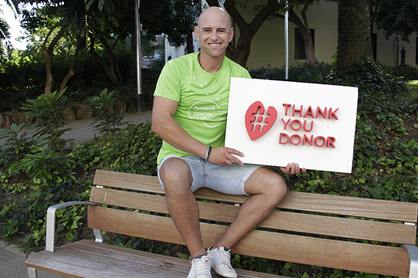Hay empresas solidarias que deciden vincularse a la lucha contra la leucemia como acto de responsabilidad social. Así lo ha hecho el Grupo Indukern –grupo integrado por Indukern, compañía especializada en distribución química; Calier, laboratorio veterinario; y Kern Pharma, laboratorio farmacéutico- con su programa solidario: “Redondeo de nómina“.
Suscripción solidaria a La Vanguardia
Nuestra Fundación ha sido escogida beneficiaria de la campaña “Suscripción Solidaria” que lanza La Vanguardia para estas Navidadades.
Giving Tuesday: cada segundo cuenta
Este 28 de noviembre hemos celebrado el Giving Tuesday, un movimiento global que promueve la solidaridad y las buenas acciones entre personas, organizaciones y empresas. Desde nuestra Fundación, hemos participado lanzando un reto solidario de 10.000 € con el fin de impulsar nuestros proyectos de investigación.
Marcapáginas solidarios para ayudar a Aina
Tras recibir la noticia del diagnóstico de leucemia de su amiga Aina (7 años), Georgina (10 años) tuvo la iniciativa de confeccionar marcapáginas solidarios para venderlos y recaudar fondos para investigación.
Entrevista a la Dra. Anna Barata, investigadora y psicooncóloga
La Dra. Anna Barata es psicooncóloga del Servicio de Hematología del Hospital de Sant Pau e investigadora del Instituto de Investigación contra la Leucemia Josep Carreras. Es licenciada en Psicología por la Universidad Ramón Llull y, recientemente, ha obtenido el título de Doctora por la Universidad Autónoma de Barcelona.
La boda de Nuria y Rubén, un impulso a la investigación
Hay muchas formas de colaborar en la lucha contra la leucemia. Algunas personas deciden hacerlo en fechas señaladas como cumpleaños, bodas, comuniones, bautizos… dándole, así, un valor añadido a un día que ya es propiamente muy especial. Así lo hicieron Nuria y Rubén, el día en que se dieron el “sí, quiero”.
Imparables contra los Síndromes Mielodisplásicos
Cristina, Noemí, Inma y José Ramon son expacientes de síndrome mielodisplásico (SMD), un grupo de cánceres de la sangre que se diagnostica cada año, en nuestro país, a más de 2.000 personas.
25O – Myelodysplasic Syndromes Awareness Day
Myelodysplastic syndromes: a heterogeneous group of rare diseases that are difficult to cure. A huge challenge for research.
- Every day in Spain five new cases of myelodysplastic syndrome are diagnosed. It is a blood cancer that is very difficult to cure.
- Research is essential for this group of diseases because statistics show that the same number of people are cured now as were ten years ago.
- Some of the world’s most highly regarded international experts are working on one of the lines of research at the Josep Carreras Leukaemia Research Institute, a line devoted entirely to this kind of disease.
Today, 25 October 2017, is MDS World Awareness Day. What myelodysplastic syndromes have in common is that the bone marrow stem cells, the function of which is to produce all blood cells, have a defect which causes them not only to produce fewer cells than normal, but to produce faulty cells that are incapable of carrying out their usual functions. They constitute a heterogeneous group of rare diseases such as refractory cytopenia with unilineage dysplasia, refractory sideroblastic anemia, refractory cytopenia with multilineage dysplasia, refractory anemia with excess blasts 1 and 2, myelodysplastic syndrome associated with isolated del(5q), and others that are unclassified. Every year more than 2,000 people are diagnosed with some sort of MDS in our country.
● What are the great challenges facing us today?
The incidence of MDS increases with age, the average age for its appearance is 70. Only 10% of patients are younger than 50. Most patients, therefore, are old and are not candidates for the only course of treatment known, so far, to provide a cure for these diseases, a bone marrow transplant from a donor. The high levels of toxicity and the side effects of this procedure make it unsuitable for older people. Consequently some patients receive no treatment, or only treatment to improve the symptoms, and for 30% of them the course of the disease is very aggressive.
The great challenge for research into myelodysplastic syndromes is therefore to be able to predict those patients for whom the disease will present an aggressive course and to find new drugs to definitively cure the disease.
Dr. Francesc Solé is the scientific director at the Josep Carreras Leukaemia Research Institute’s ICO-Germans Trias i Pujol Campus, vice-president of the Spanish Myelodysplastic Syndromes Group (GESMD) and member of the world committee of experts, the International Working Group for the Prognosis of MDS (IWG-PM). The work of his research team is focussed exclusively on this group of diseases in their quest to provide MDS patients with better opportunities than are currently available.
Dr. Francesc Solé says, “Research is the key that will enable more patients suffering from MDS to find a cure. Statistics show that the same number of patients are cured today as were ten years ago. We have to concentrate our forces on research to improve these statistics. Nevertheless, we know more and more about MDS and because of that we are closer to being able to design new drugs that will cure more patients”. He and his team are deeply involved in the study of MDS and are using massive sequencing, or next generation sequencing (NGS) for the purpose. This technology makes it possible to identify the mechanisms responsible for the way the disease will develop, and with that knowledge it is possible to predict the evolution of the disease and propose appropriate treatment. This research group headed the publication of the Guides for the application of massive sequencing for the diagnosis of MDS, which will be presented this week at the Spanish Society of Hematology and Hemotherapy Congress, to be held in Malaga from 26 to 28 October.
● Why are massive sequencing techniques so important in the diagnosis of MDS?
Over the last decade DNA sequencing has revolutionised our understanding of various diseases with a genetic base such as MDS, and their origins. This technique shows that these diseases appear on account of mutations in genes involved in numerous functions and mechanisms. These genetic mutations regulate the evolution of the disease from its outset, stages such as MDS, and in the last instance, the transformation of the disease into acute myeloid leukaemia.
The application of massive sequencing techniques to the study of MDS has made it possible to identify recurrent genetic mutations in more than 40 genes. At the present time it is estimated that most patients (80-90%) present at least one mutation in some gene. Consequently, at the present time, these studies make it possible to have a better characterisation and stratification of patient risk, and therefore also make it possible to be able establish a good diagnosis and prognosis. As a result of this, many centres have introduced massive sequencing genome studies as part of their daily clinical practice in an attempt to personalise the diagnosis, prognosis and treatment for MDS patients. The guides that will be presented at the Spanish Society of Hematology and Hemotherapy Congress identify the genes that should be evaluated for all patients who might be diagnosed with MDS, and they establish the minimum quality and standardisation criteria to be used in order to achieve a correct molecular diagnosis for MDS. Furthermore, the guides also recommend ways to produce the reports on the sequencing results
The researchers are also concentrating on finding drugs to correct the alterations that make the disease evolve.
Nueva tienda solidaria online
Te invitamos a visitar la nueva web de nuestra tienda online a través de la cual podrás ver los productos solidarios que tenemos disponibles: camisetas, tazas, bolsas, pulseras, libretas… y muchos otros detalles para poder hacer (o hacerte) un bonito regalo con valor añadido.
Día Mundial del Donante de Médula Ósea
El tercer sábado de cada mes de septiembre se celebra el Día Mundial del Donante de Médula Ósea y Sangre de Cordón Umbilical, una iniciativa de la World Marrow Donor Association (WMDA). Su objetivo es recordar a los ciudadanos de todo el mundo la importancia de la donación de médula y la necesidad de informarse adecuadamente antes de tomar una decisión que puede salvar vidas.

